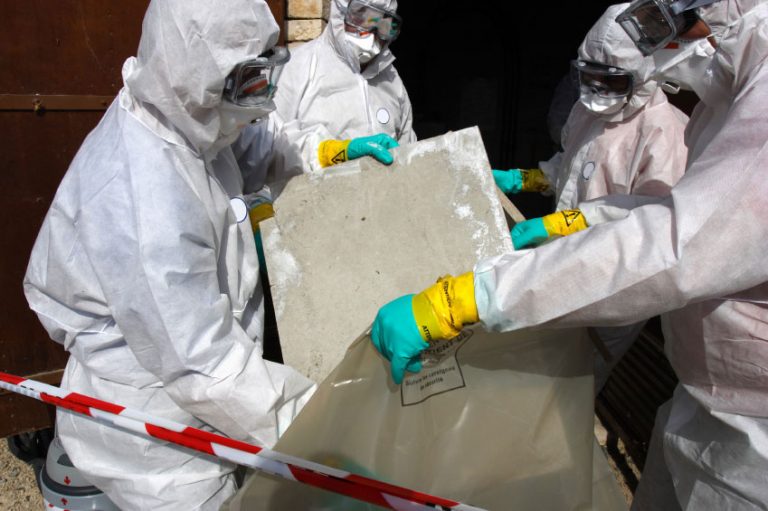Asbestos in rented property exists in significant numbers across the country. The long-term harmful effects of asbestos inhalation are well-known and the unsettling fact is that, despite being banned in 1999 in the UK, the number of rented properties affected is believed to run into the millions. In fact, such was the widespread use of asbestos in construction, it is safer to assume that it is present in any building constructed before the mid-1990s.
What is Asbestos?
The term asbestos relates to six different naturally occurring minerals which all have similar properties allowing them to be processed into a fibrous texture. When mixed with building materials such as cement, asbestos makes them much stronger, resistant to fire and electricity.
There are three main types of asbestos commonly found in residential properties:
- Crocidolite (blue asbestos)
Found in: Insulating boards, ceiling tiles and thermal insulation products. - Amosite (brown asbestos)
Found in: Materials to reduce condensation or provide acoustic insulation against sound. - Chrysotile (white asbestos)
Found in: Roof coatings and cement based sheet materials. This is the most common type of asbestos found.
Where is Asbestos found in buildings?
Asbestos was used extensively in domestic rental properties and can be found in many areas, such as…
- Loose fill insulation
- Textured wall and ceilings
- Lagging around pipes
- Water tanks
- Ceiling Tiles
- Asbestos insulation boards (AIB)
- Bath panels
- Partition walls
- Airing cupboards
- Roofing Felt
- Soffits
- Guttering
- Decorative paints and plasters
If you are unsure about the presence of asbestos in your property you should always engage a licensed Asbestos management company to carry out a thorough investigation. It’s just not worth risking the lives of your family or tenants.
Landlord’s responsibilities
When renting out a house, landlords have a legal responsibility to minimise the risk of exposure to asbestos under the Control of Asbestos Regulations 2012. These regulations apply to ‘non-domestic premises’, particularly industrial and commercial buildings, but are relevant to rental properties if there are communal areas such as foyers, corridors, bike sheds, garages and staircases. Section 4 of the legislation dictates who is the “dutyholder” and exactly what their responsibilities are.
Landlords who own houses which have been divided into flats, for example, are likely to be covered by the scope of the legislation if communal areas exist in their property. The individual flats themselves would not be covered by the law, at present, though a clear moral duty of care exists towards tenants in any rental property.
If, as a landlord, you’re not obliged contractually to look for and manage asbestos in your rental property there’s still a chance you could eventually be held accountable for any injury caused to tenants by the presence of asbestos. You could find yourself challenged for negligence under the Defective Premises Act 1972.
Asbestos health risks
Asbestos that remains in situ without becoming disturbed should pose no risk to human health, but any action that causes fibres to work loose with the potential to be inhaled could cause terminal cancer, with symptoms not immediately obvious, sometimes for decades.
Inhalation of the fibres can cause many different health problems, such as pleural thickening, Asbestosis, Mesothelioma and asbestos-related lung cancers. There are currently no known cures for any of these illnesses
It’s estimated that 13 people die in the UK every day from previous exposure to asbestos. More than twice as many that die in road traffic accidents.
In the image below we can see recent related death statistics and the different conditions that led to death.

Essential steps when assessing asbestos in rented property
The Health and Safety Executive has identified a number of measures that should be taken by landlords to assess and control the risk posed by asbestos in communal areas of their rental properties:
- Find out if asbestos exists in the property, arranging for professional testing in all suspected cases.
- Arrange for the confirmed asbestos to be assessed by an expert to determine whether it is in a safe condition.
- Create a record of the location of asbestos, such as making a plan drawing.
- Arrange for qualified licensed professionals to remove asbestos under controlled conditions in the event that it is deemed to be unsafe.
- Ensure that workmen who plan to carry out maintenance in an area where asbestos exists are made aware of its presence to prevent it from being accidentally disturbed.
Remember, the identification, assessment and removal of asbestos can only be carried out by professionally qualified and licensed contractors. Attempting to remove the substance yourself is illegal, not to mention highly dangerous to you and your tenants.
Download our 30 point checklist for landlords. It’s packed with information to help you get ready to rent out your property.



